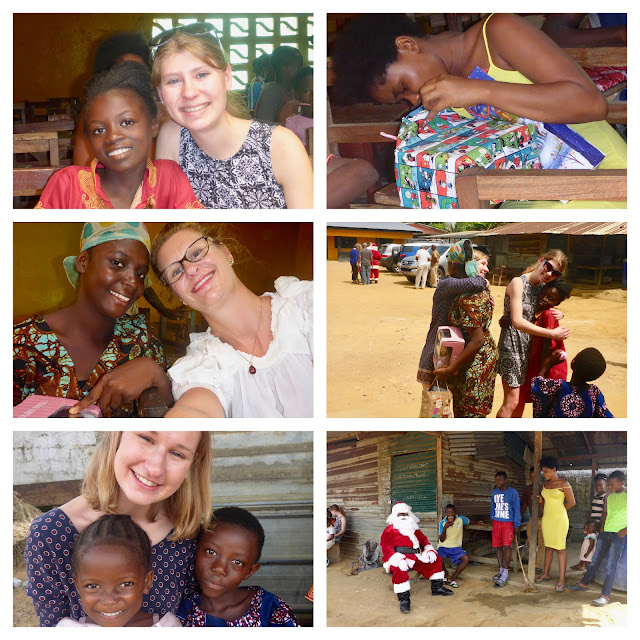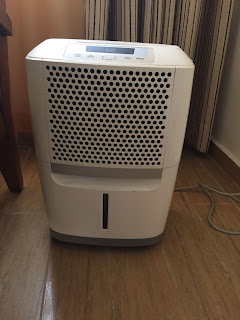Liberia doesn't have the draw of safaris or wildlife parks. There are no leopards, elephants, lions, zebras, hyenas, giraffes, gorillas, gazelles, rhinoceros, water buffalos, wildebeests, or ostriches. Almost any animal that you think of, when thinking of Africa, is not here in Liberia. So we don't have safaris to go to, but what we do have is Monkey Island.
Our journey began when the paved road ended and the ruts of a golden brown dirt road led the way into Marshall, a small town on the coast of Liberia. We had a bit of an idea of what we were going to do: find the boats then hopefully barter a price with someone willing to haul the Americans around for a few hours. Chad and Damon found a few men who led them off into the village. If a few strangers are hanging around, curious kids appear to see what treasures they may have. We had fun handing out some Twizzlers and showing them how to take the plastic off and chew the candy.
Chad and Damon returned, happy with the price and happy to have found guides for the trip. Marshall, a fishing town, is lined with dug-out canoes and colorful fishing boats. We stepped into the water of the lagoon where the Farmington River meets the Atlantic Ocean. The water was warm and crystal clear. We climbed into the boat, trying desperately to keep our balance and not tip the whole thing over. Fishing nets filled the spaces between seats. We started by sitting single file, but when the whole boat listed to the side and my knuckles, which were gripped tight to the side, felt the coolness of the water I screeched. This completely surprised the two men positioned at each end of the boat, one a guide and the other the driver. Accustomed to the sway and rocking of the boat and knowing it's boundaries, they had no thought in the world that we would tip over. But because they didn't want to listen to the screeches of a woman for the next bit, they had Chad and Damon stand to help steady the boat as it floated forward.
The ride to the island was peaceful and beautiful. The village behind us with a few huts sprinkled along the shore, disappeared into the past. We crossed the mouth of the river on one side with jungle stretching on the other. A tree in the distance, stood taller than anything around and spread its branches in the sky. For some reason, this tree spoke Africa to me. We were alone now. Five Fabers, two guides and a boat.
An interesting fact about Monkey Island; there aren't any monkeys on this island. Seriously. I have no idea how the island got its name. There are chimpanzees on this island. And there's not just one island, but rather 4 in this group that have these chimps living on them. The story of these chimps is very similar to that of Liberia. It's sad and broken and limping along with no solution in site. In 1974, chimps were taken from the northern, mountainous areas of Liberia and brought to the Liberian Institute of Biomedical Research, a testing facility partnered with the New York Blood Center to conduct medical testing. Over 100 chimps were injected with infectious diseases. Once a chimp tested positive, it was taken to Monkey Island for follow-up testing. Because chimps don't swim, the island became a natural refuge for the animals. Testing continued through 2005 until it was proven that the testing was cruel to the animals. It has been said that the testing done here led to vaccinations for hepatitis B and screening for hepatitis C - two diseases than have affected millions of people throughout the world. The researchers continued to feed and water the chimps on the islands until the height of the ebola crisis in 2014. Then the chimps began to starve. There also isn't a natural fresh water source on the islands, so in dry season they must be given water as well. In 2015 the Humane Society took over care for the animals. Today locals are paid to feed and water the chimps on a regular basis. I've heard rumors that the chimps were sterilized or that the food they are given has birth control in it. Our guide disagreed saying that babies are still being born, increasing the population. Today there are around 70 chimps throughout the islands.
Our boat pulled up to a metal stand, located about 30' offshore. A large sign stated "Second Chance Chimpanzee Refugee; Humane Society; Danger. Our guides knew how close they could get without being harmed by the chimps. Chad, Damon and Elena jumped out of the boat and onto the stand to watch the chimps as they rocked back and forth on their knuckles and shook their heads. They moved around a bit and began to settle, although one continued to shake his head reminding me of a bobble head toy. We stared at one another, neither party willing to move. Eventually the dominate chimp decided he would rather look down on us to assess the danger so he climbed up into a tree. It was fascinating watching these animals in the wild.
Back in Marshall we took time to walk around, visit and hang-out with the kids. Before leaving we wanted to get a photo of our entire family with the kids. We asked one of the men we had been talking to if he would take a picture. Elena showed him where to look and how to press the button. We got the kids posed and waited while three men examined the camera, discussed and eventually appeared to take a photo. When we got home we had a good laugh at the two photos they took. The first was of our feet and the sand, the second had all the kids in it, but our heads were chopped off!
























































